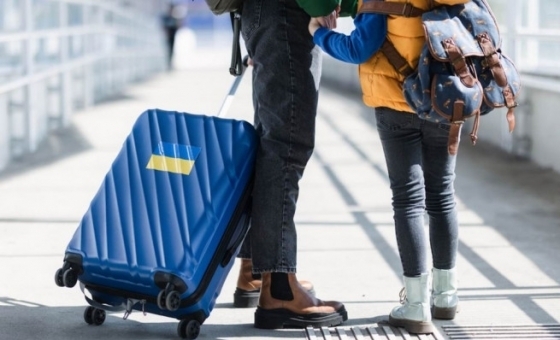
During June and July, the first stage of the project “Social and psychological support of residents of Luhansk region and other regions who are currently suffering from hostilities as a result of the war in Ukraine” was implemented on the territory of the Chervonograd community. The main performers were members of the public organizations “Mist 3.10” (Lysychansk) and “Do-Ya-Ty” (Chervonograd). The measures were implemented within the framework of the project of the German Society for International Cooperation (GIZ) “Development of service provision structures and educational potential for psychosocial support in Eastern Ukraine” on behalf of the Federal Government of Germany.
The head of NGO “Mist 3.10” Iryna Selnytska told Chervonograd.City journalists about the results of the first stage of the project:
– Now I can say with confidence that during the implementation of the first stage of the project, we achieved the results we were striving for. The main thing is that we provided first psychological aid to people who now need it the most.
We employed two professional psychologists who provided both individual and group counseling to forced migrants. We also held various master classes in order for people to distract themselves from the harsh reality and try to find activities to their liking.
Artists of the Prybuza region taught internally displaced persons to make dolls, wool products, and clay dishes on the potter’s wheel. And the immigrants learned how to paint gingerbread with edible glaze and cook authentic Georgian khachapuri. The participants of our project got an unforgettable experience from a fourteen-kilometer kayaking trip down the picturesque Rata River.
In general, the resettled people very actively participated in the activities that we proposed. In order not to cause them much trouble, meetings were held in places of compact settlement. Because forced relocation from a permanent place of residence, especially during wartime, is a very difficult test and burden. Especially when people have to live in adapted premises, such as schools or kindergartens. Therefore, our initiatives became a real breath of fresh air for them, an opportunity to feel needed and useful.
– How, in your opinion, do immigrants live in Chervonohrad? What do they need most?
– I myself have been displaced twice already. Therefore, I clearly understand that, above all, these people need the attention and respect of others. Another no less important aspect is housing. You can live in adapted premises for several weeks or months, and then it is very difficult.
Unfortunately, we have to prepare for the fact that the current war may continue for quite some time. And that’s why we should all think about what to do next, make plans for the future, taking into account the realities of life. For forced migrants, it is important to find a new occupation, a new job, in order to independently provide a decent life for themselves and their relatives.
– You have already had to change your permanent place of residence twice in connection with the war. Tell us about how it was.
– I was born and grew up in Luhansk region. She lived most of her life in the city of Pervomaisk, which was occupied in 2014. She was an entrepreneur, engaged in trade business. After the start of hostilities, my family and I moved to Lysychansk, liberated from Russian troops. The man worked at the Toshkivska mine.
After the forced relocation, I tried to rebuild my business. She opened a children’s cafe “Kapitoshka” in Lysychansk, which existed for 15 months. Unfortunately, it had to be closed because the economic situation in the city and the region was very difficult. While the cafe was still working, people came to me, we actively discussed the need to create a public organization of displaced people. In February 2017, the NGO “Mist 3.10” was officially registered.
Our main goal was to convey to Ukrainian society the statement about how important it is not to divide people into immigrants and locals. We are one country, one community. And it doesn’t matter if we were born in the eastern or western part of the country. We must be together and remember that we all have the same enemy.
Over the course of several years, we implemented a lot of useful things in Lysychansk. One of the most important was the opening of the documentary theater site, on the basis of which they were able to stage five plays based on real events. And last year, we got to know Roman Lukyanchuk and Eleonora Synegubova, heads of the public organization “Do-Ya-Ty” from Chervonograd. They came to us in Lysychansk, we made plans for future cooperation.
But after the beginning of the full-scale invasion of Russia, it became dangerous to stay in Luhansk region. Therefore, we decided to move to the conditionally safe Chervonograd in order to help numerous displaced people who were forced to come here from those parts of our country where hostilities were or are still being waged.
– In Chervonograd, they buried your husband, Hero, who died in the battle with the Russian invaders.
– My husband, Serhii Selnytskyi, has been defending Ukraine with a weapon in his hands since 2016. When it became known about the full-scale invasion of Russia on February 24, he immediately returned to the ranks of the Armed Forces of Ukraine. Serhii died on the 22nd

